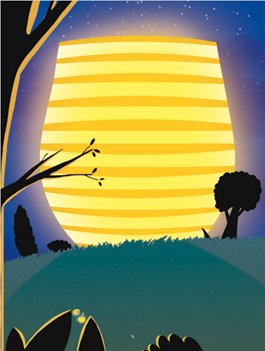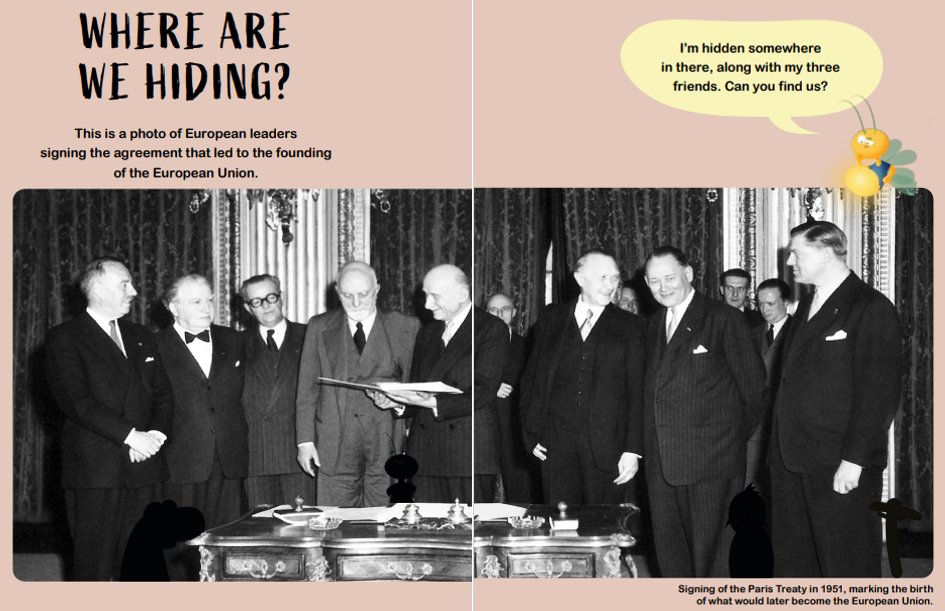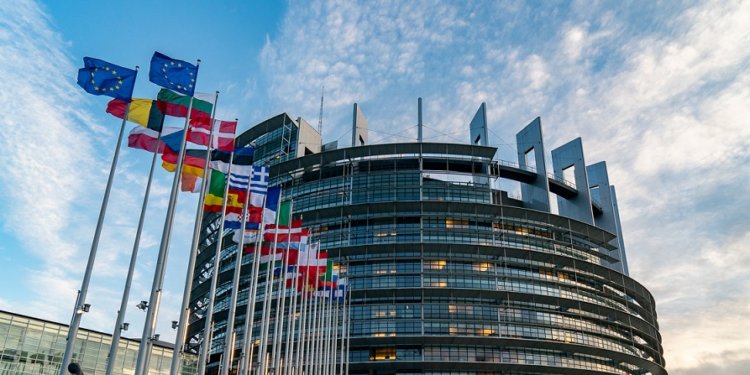If you are a parent who has just innocently sent your young children off to school in an EU member state this new autumn term, then what will they come back from class having learned? How to read, write and add up, hopefully. But also, perhaps, they will return home bearing the awesome knowledge that the European Union had generously saved them and their entire families from inevitable death in yet another of the continent’s periodic pan-continental conflicts of all-out racial genocide. And also, how to colour in all the EU member states’ flags properly without ever accidentally going outside the lines, of course.
Amongst all its innumerable other fingers in political pies, the EU today has its own special sub-department aimed at teachers and schools, pumping out learning material designed to educate children about how utterly essential the Common Agricultural Policy, the Schengen Agreement and the Lisbon Treaty are for their future economic prosperity and social wellbeing, and how they’d all be lying dead in a neo-Nazi mass war-grave without them.
According to the relevant section of the website of the Publications Office of the EU, “The EU supports its Member States in their efforts to provide high-quality and widely accessible education and training” by “facilitating exchanges of information and experience”. To this end, it has now beneficently spent EU taxpayers’ money producing a wide variety of “publications and educational games” with fascinating-sounding titles like Europe Organising Together!, EU & Me and The EU Council Explained, which are “intended to support young people and teachers in learning about the EU, its values and its policies, and about the functioning of the EU institutions, their responsibilities and their work”.
Anarchy in the Yooki
Its latest range, aimed at primary schools, is a series of colourful illustrated texts featuring a poorly-drawn cartoon firefly called Yooki. Besides appearing in some new flag-based colouring activity books released in time for the new 2024-25 academic year, the friendly light-emitting insect chiefly stars within a mercifully short illustrated 2023 storybook, Yooki and the Union of the Forest, and an associated Learn With Yooki Activity Book, in which a war between different species of forest animals over jam and other such scarce natural resources is only narrowly averted thanks to the intervention of a giant enchanted glowing lantern – one that is shaped miraculously like one of the main EU Parliament buildings, and within which all the animals conveniently learn to talk to one another, compromise and make eternal peace in the rough manner of Jean Monnet.
This is all meant to stand in for how the EU supposedly saved Europe after World War II, with kids subsequently exhorted to engage in a series of bizarre and beyond-parody workbook exercises illustrating the need for Schengen-style freedom of movement for earthworms and a Common Agricultural Policy laboriously hammered out between woodpeckers and salamanders.
Written in prose so leaden not even an alchemist could save it, the whole Yooki series is a pathetically transparent attempt to brainwash children with a brand-new Left-wing political origin-myth for the continent to replace all those ‘outmoded’ old classical and Christian ones we’re all supposed to hate and forget about now, and a prime example of how the EU continually wastes its budget on complete, self-congratulatory drivel. Admittedly, they are at least free for all professional infant indoctrinators to download or order a physical copy of without any charge – but only at the point of ordering; in reality anyone who signs up for one will have already paid for it unknowingly via their previously stolen tax-money.
The parent Forest book opens with some preparatory small-print aimed at teachers, advising them that it is aimed at the seven to nine age-group, and is “designed to explain to children… what the European Union is and how it came about” as well as “the key reason why the European Union was founded: to keep peace between its Member States”. Absolutely fascinatingly for the average seven year-old, “in addition, it explains the role of the European Council and the Council of the European Union as the house of the Member States”. Perhaps it also explains the difference between the Judean People’s Front and the People’s Front of Judea while it’s at it?
Magic Lantern Show
As the story begins, Yooki’s sensitive antennae are throbbing painfully at the sound of a loud argument playing out across his enchanted Euro-forest. Lilou, “leader of the earthworms”, is distressed her habitat has just been caused to collapse after being invaded and annexed like the Sudetenland by the mighty Führer of the salamanders, Frida. “Go away, this is my land!” screams the unacceptably nationalist-minded Lilou, but Frida is largely unapologetic: all her race’s vital stores of jam have gone missing, it being well-known that amphibians of the order Caudata exist largely upon fruit-based spreads. Soon, other rival species are getting involved in the nascent conflict and, before you know it, Wood War III breaks out – not over Poland this time, but over jam. Ironically, peace could just not be preserved.
His poor antennae still pulsing, Yooki seeks advice from the wisest old tree in the forest, Arber, who tells him of how, not so very long ago, the grandparents of all the Euro-animals had fought amongst one another in precisely the same fashion, leading to the continent’s near-destruction. The only way they had been able to avert Animal Armageddon was to agree to meet up within a magical shining building hidden away somewhere deep within the trees, called ‘The Lantern’, whose amazing, quasi-religious qualities somehow allowed all those who entered it as sworn enemies to walk out paw-in-paw as perpetual pacifist friends, the German wolf and the French lamb lying down together as one. Yooki had always thought tales of the Lantern were mere utopian myths, but no. The Lantern is real, and it looks like this:

By pure coincidence, meanwhile, one of the main Brussels assembly buildings of the EU, The Europa Building, just happens to look like this when drawn on the European Council’s current official logo:

Pick up your pencils and spot the difference, kids!
At this point, Yooki successfully gathers up all the warring animals, herds them inside the Lantern and, under the influence of its enchanting bureaucratic spell, they each learn how to negotiate and make peace. How so? Well, in true Schengen fashion, their sagacious leaders agree unquestioningly to instantly abolish all unnecessary trade-impeding internal borders by virtue of allowing the earthworm-race to “dig tunnels under the entire forest” like a benevolent vermiform Hamas, and for all species to share their excess annual jam-harvests with one another forever in a rough analogue of the Common Agricultural Policy, The End.
Except… not quite The End, because the EU process is perforce one of ever-greater enlargement, with an outside centipede, perhaps of Turkish, Albanian or Ukrainian origin, observing how successful the organisation is and immediately applying for provisional full membership status. “Together, we shine!” concludes Yooki, a possible oblique reference to the current obvious success of EU green energy security policy. His own personal on-board abdominal light-source is, of course, 100% naturally renewable.
Exercises in Futility
The storybook’s associated activity workbook, designed to relentlessly ram home the exceedingly unsubtle message that, without the EU, every last member of the class reading it would starve in a fascist bomb-crater and die, is even worse. It honestly features “fun” – the actual word its rather optimistic authors use – exercises such as the below pair of comically soporific horrors, which are quite beyond all adequate verbal description:


Would you be happy with your child being force-fed worthless cartoon agitprop like this to read by their teachers? Perhaps not, but how likely is it that such a thing will ever really actually occur? Oddly enough, on its site, the Publications Office of the EU provides no specific figures proudly boasting about how many copies of Yooki’s incredible adventures have thus far been printed, distributed to schools or downloaded by teachers across the continent in any one of the EU’s many official languages. I suspect this may be because said sum total hovers around embarrassingly somewhere very close to zéro, nichts, nul, cero, or at least I sincerely hope this may be so.
Most likely, any halfway sensible teachers across Europe will take one look at these dismal sub-literary products and decide to read genuine small kids’ classics like The Very Hungry Caterpillar with their young charges instead, possibly whilst opportunistically recasting the story as a potential metaphor for unsustainable EU budget demands and welfare spending while they’re at it, with Mario Draghi as the greedy fat grub in question, just to spite the books’ hubristic producers.
Educationalists should not be too hasty in their dismissal of these propaganda texts’ potential pedagogical utility, however. After all, by boring them substantially along the path into an early grave, they will doubtless teach fledgling readers a highly useful lesson in life: that the European Union has a very cavalier attitude indeed towards the spending of their parents’ hard-earned tax-money on complete and total nonsense which serves no good or useful purpose to its actual citizens whatsoever.
Being a freeborn Englishman myself, I give nightly praise to the Almighty Lantern that, thanks to the true magic of Brexit, the real Yooki within which I live, work and pay my taxes is no longer a part of the whole failing Union of the Forest at all any more. And that, dear children, is this story’s real Happy Ending.
Steven Tucker is a journalist and the author of over 10 books, the latest being Hitler’s & Stalin’s Misuse of Science: When Science Fiction Was Turned Into Science Fact by the Nazis and the Soviets (Pen & Sword/Frontline), which is out now.













To join in with the discussion please make a donation to The Daily Sceptic.
Profanity and abuse will be removed and may lead to a permanent ban.